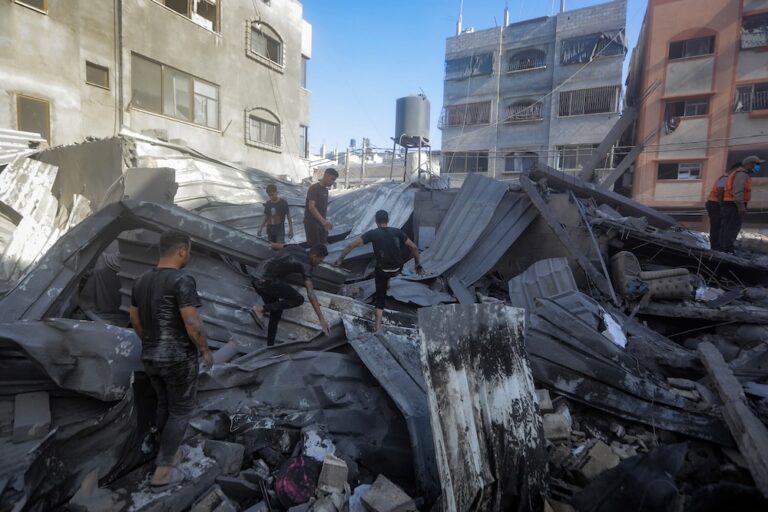(IFJ/IFEX) – The following is an IFJ media release: April 5th 2002 Protest Over Ten Palestinian Journalists Arrested in Bethlehem According to information received by the IFJ from the West Bank, 16 Palestinian journalists were arrested in the press centre in Bethlehem Municipality by the Israeli Defense Forces (IDF) and transported yesterday morning to the […]
(IFJ/IFEX) – The following is an IFJ media release:
April 5th 2002
Protest Over Ten Palestinian Journalists Arrested in Bethlehem
According to information received by the IFJ from the West Bank, 16 Palestinian journalists were arrested in the press centre in Bethlehem Municipality by the Israeli Defense Forces (IDF) and transported yesterday morning to the military Headquarters at Kefar Etzion near Bethlehem. Yesterday afternoon, three journalists were released from Israeli detention and three more were let go the same evening. Ten remain in detention.
“The conditions surrounding the detention of the journalists are unacceptable,” said Sarah de Jong, IFJ Human Rights Officer, “their mobile telephones were confiscated along with tapes, and their cameras and equipment were destroyed by soldiers. The journalists had their hands and legs manacled. Only three at a time were released from their handcuffs to be able to eat.”
The IFJ says that Norwegian journalists who have confirmed the incident claim the journalists repeatedly told the soldiers that they were reporters, but the IDF said that they were prisoners of war.
On Thursday morning, the journalists were taken to the District Coordination Office in Beit Jala, and from there to Israeli Military HQ, south of Bethlehem, where they were blindfolded and detained. Three of the 16, Said Ayyid (journalist, Voice of Palestine), Walid Abu Alia (photographer, Al-rouah TV), Ahmad Mezher (photographer, Al-Mahed TV) were released on Thursday afternoon, and the same evening three others, Mustafa Salah (editor, Al-rouah TV), Ala Daoud (technical operator, Al-rouah TV), and Ala al-Abed (Palestine Broadcasting Corporation) were freed.
When asked about when the remaining 10 might be released, IDF said they did not know and added that because terrorists on earlier occasions have used a journalist cover IDF could not know whether the captured men really were journalists.
The IFJ represents more than 500,000 journalists in 103 countries


